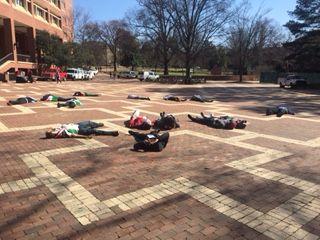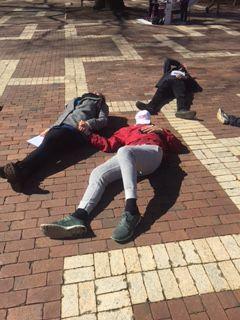What started as a peaceful protest to raise awareness of the ongoing conflict between Israel and Palestine became heated when a Jewish student sought to challenge the narrative presented by protesters.
A dozen students with the NCSU Students for Justice in Palestine held a “die-in” protest Thursday in the Brickyard in which they laid down with Palestinian flags draped over their faces and bodies to symbolize the lives lost in conflict. Each of the protesters also held a picture of a victim along with the story of how he or she died.
“We are just trying to promote awareness at NC State because not a lot of people know what’s going on in the Middle East, specifically dealing with Israel and Palestine,” said Zayn Hamad, a senior studying textiles and president of NCSU Students for Justice in Palestine. “We’re just trying to be a voice for the Palestinians.”
Hamad blames the national media for presenting a one-sided view of the issue, which tends to present Israel as being in the right and Palestine as being in the wrong. Hamad said that when she reads about the conflict, Palestinian deaths are often dismissed as if Palestinians are always the aggressors.
“The media doesn’t cover what’s going on over there as well as they should,” Hamad said. “They cover what’s happening in Israel all the time, but with Palestinians it’s always, ‘oh three Palestinians were shot dead today.’”
Many students passing by stopped to read the stories of victims or craned their necks at the demonstration from a distance. Those who stopped to read the stories of the victims expressed frustration with the situation and had little to offer in the way of a solution.
Jordan Dembski, a freshman studying life sciences, said he doesn’t know much about the conflict and has little connection to it as a college student.
“It just seems pretty far away,” Dembski said. “Especially since when you’re a busy college student you got classes, you got exams to worry about you don’t really actively go and do research.”
As the protesters were leaving, a Jewish student who wished to remain anonymous approached them and began questioning their motives.
“The [protest] had already ended, and so I went and put on my shirt with the Jewish star — because I’m Jewish — and just wanted to see what they were saying,” the student said.
The ensuing discussion began to escalate as details of the history surrounding this conflict are rife with misinformation on both sides, and other students began joining in.
The instigating student asked the student leaders of Students for Justice in Palestine why Israel should be blamed for being careful in regards to their treatment of Palestinians who want to cross the border when there is legitimate fear of terrorism.
“What really made me mad was when we asked him what gives them the right to hold us in a room with nothing for hours and interrogate us when we’re trying to go visit our family over there, and he was like, ‘Can you blame them for doing that to you?’” Hamad said. “He basically called us terrorists because we’re Palestinian.”
The anonymous student said people were yelling at him asking if he was calling them terrorists.
“One of the girls who obviously had family over there said, ‘Do you think I should have to be stopped at the border and questioned?’ And I told her yes because there’s terrorist attacks all the time in Israel,” the student said.
The student said he knew someone through a mutual friend and member of the Israeli Defense Force, who was shot and killed by a Palestinian. He said that it’s good that Israel is “keeping a lid on it,” referring to who is able to enter the country, because various terrorist groups have a stated goal of destroying Israel.
“I did as good as I could [in the argument] because I’m not a walking book of statistics. They were throwing out all these numbers, and I just told them the facts of the whole situation from an Israel supporter’s side,” the student said.
Hamad said other accusations made by the student were misinformed.
“If you’re going to come and present an argument to us, don’t first off lie and second, just because you’re pro-Israel you still have to learn the facts on both sides of the argument,” Hamad said.
Sarena Triesh, a junior studying communication and one of the protesters, said she’s open to having a discussion as long as it is a reasoned discussion rather than one based on assigning blame.
“I cannot stand talking to [people who seek to assign blame in arguments] because those are the people who you’re not going to change their minds, they have their set of beliefs,” Triesh said. “I want to educate the people that don’t know what’s going on in the Middle East and I think we did that very effectively today.”
Several minutes into the demonstration, some of the campus preachers began to draw attention to the students lying down and began to preach alongside them, trying to co-opt their messages.
Hamad said that the preachers began to ascribe things to the protesters that were not true as part of their usual sermons. They later joined in as the rhetoric began to heat up.
“I kind of knew that was going to happen,” Hamad said.
The preachers were unaffiliated with the protesters.
Students for Justice in Palestine has other protests planned for the future to continue to promote dialogue over the issue.
“I think the die-in was really effective, because it’s just a silent protest, and if you want to learn more, you can, but if you don’t, you can just walk away,” Hamad said.









